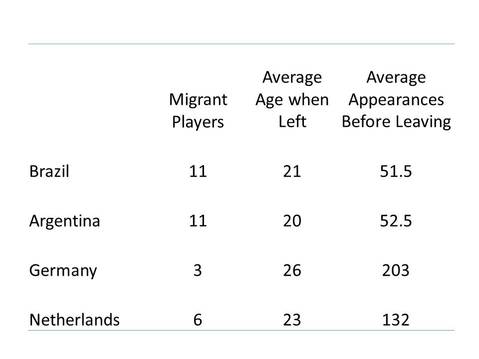
Of course the causes of the decline and fall of Brazilian football are varied and multifaceted - some being proximate causes (David Luiz's positioning inability) and some long-term (the pile 'em high approach referred to in the same article by Early). The exodus of Brazilian talent prompted me to consider the experiences of other countries to see if there is something unique about the Brazilian experience. Perhaps the idea struck a chord because in Ireland we have a similar problem of 'talent drain' and so the only thing we have in common with Brazil is not getting a hammering at home from Germany in this World Cup competition.
The blog has seen posts recently on the 'granny rule' and the effects of previous generations' migration on international football teams' performances. Perhaps a related issue is the immigration of young professional footballers and the effect that might have on a national team's identity and performance.
I looked at the starting 11 of the four semi-finalists (Brazil, Germany, Argentina and the Netherlands). The experience of the players in terms of their migration patterns are quite striking. Each country has a strong domestic league.
In Brazil's case, as Ken Early pointed out, most of the players left Brazil at a young age after relatively few appearances in the Brazilian league. The most extreme case is Hulk who played only once for Vitoria before leaving at 19, initially to Japan. Of the 11 starters only Fred plays in Brazil currently, though he also left Brazil when he was 22 after 69 league appearances. On average players left Brazil at 21 years old and having made 51.5 appearances in domestic football.
The German experience is remarkably different. Of their 11 starters, 8 have never played club football outside Germany (and Miroslav Klose is one of the three having joined Lazio at 33 years of age in 2011). The other 2, Khedira and Ozil, left Germany at 22 and 23 respectively but both had made over 100 Bundesliga appearances at that stage.
The comparison between the South American and European participants in the other semi-final is similar. All of the Argentinian players play outside their native country. The average age when they left is 20 and the average number of appearances before they emigrated is 52.5 (very similar to the Brazilian statistics). Even excluding Lionel Messi (who moved to Barcelona at 13) the average age only rises to 20.5 and the appearances to 57. Enzo Perez is a bit of an exception among the team. The Benfica player played 103 matches in Argentina before his move to Portugal.
Six of the Dutch players play abroad, with the other 5 never having played outside the Netherlands. However, the average age of the 6 when they left the Netherlands is 23 and the average number of appearances before leaving is 132. For example, Dirk Kuyt made 261 appearances for Utrecht and Feyenoord before joining Liverpool in 2006 and Ron Vlaar made 142 appearances for AZ 67 and Feyenoord before joining Aston Villa. The table shows the comparison between each country.
There are important implications in this for Brazilian attempts to address its football decline. After the abysmal performance of Germany in Euro 2000 the football association and clubs revamped football structures and player development and the fruits of that are seen now (at both national and club levels). The experience of player exodus poses the difficulty for Brazil that while it can enhance player development structures this is likely to simply make those players even more attractive to European clubs. Brazil needs to address player development (avoiding the 'law of numbers' approach referred to by Ken Early) but also address the talent drain.

 RSS Feed
RSS Feed